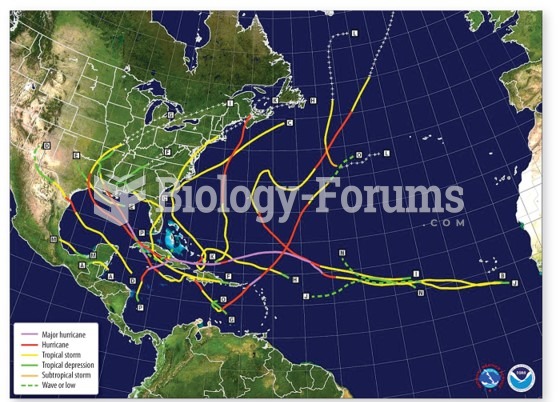Answer to Question 1
ANSWER: Hurricanes in the Southern Hemisphere show all the same features as those in the Northern Hemisphere, with the exception that in the Southern Hemisphere, the winds blow clockwise around the center.
Answer to Question 2
ANSWER: Hurricanes do not form spontaneously, but require some kind of trigger to start the air converging. For example, when a wave forms along the ITCZ, an area of low pressure develops, convection becomes organized, and the system grows into a hurricane. Weak convergence also occurs on the eastern side of a tropical wave, where hurricanes sometimes form. In fact, many if not most Atlantic hurricanes can be traced to tropical waves that form over Africa. However, only a small fraction of all of the tropical disturbances that form over the course of a year ever grow into hurricanes. Studies suggest that major Atlantic hurricanes are more numerous when the western part of Africa is relatively wet. Apparently, during the wet years, tropical waves are stronger, better organized, and more likely to develop into strong Atlantic hurricanes. Convergence of surface winds may also occur along a pre-existing atmospheric disturbance, such as a front that has moved into the tropics from middle latitudes. Although the temperature contrast between the air on both sides of the front is gone, converging winds may still be present so that thunderstorms are able to organize.
Even when all of the surface conditions appear nearly perfect for the formation of a hurricane (for example, warm water, humid air, converging winds, and so forth), the storm may not develop if the weather conditions aloft are not just right. For instance, in the region of the trade winds, and especially near latitude 20 degrees, the air is often sinking in association with the subtropical high-pressure area. The sinking air warms and creates an inversion above the surface, known as the trade wind inversion. When the inversion is strong, it can inhibit the formation of intense thunderstorms and hurricanes. In addition, hurricanes do not form where the upper-level winds are strong. The resulting strong vertical wind shear tends to disrupt the organized pattern of convection and disperses heat and moisture, which are necessary for the growth of the storm.






